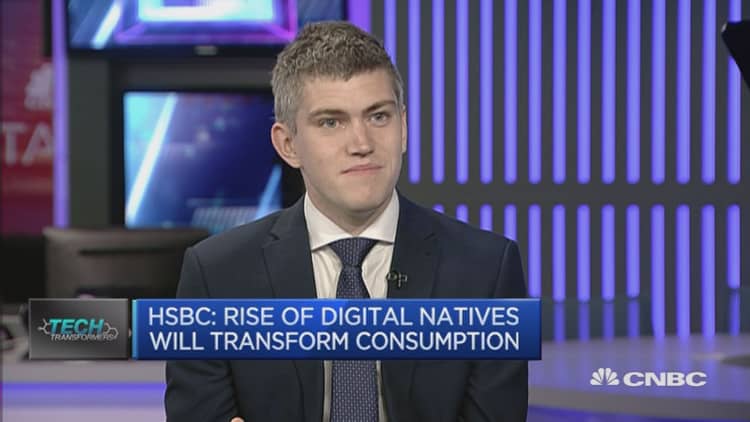
The rise of ultra-tech-savvy youngsters could push inflation even lower at a time when policymakers are already worried by stubbornly low levels of price rises, a HSBC economist told CNBC on Wednesday.
So-called digital natives — people who matured at a time of rapid IT development and are highly adept at using technology — will account for over 50 percent of the global adult population by 2050, up from 8.6 percent today, James Pomeroy said. He told CNBC their heavy use of technology could send prices lower in a number of ways, including through greater consumer information, improved supply chains and increased access to alternative cheaper products.
Euro zone annual inflation was seen at 0.2 percent in both July and August, according to the official flash estimate from the European Union — far below the target of under but close to 2 percent. Meanwhile, the Consumer Price Index for the U.K. suggested inflation stood at 0.6 percent on the year in August.
"We are thinking about a world here where we have great price information. It is very easy for us to compare the price of a flight, of a book, of a CD, whatever it may be and therefore companies find it really hard to raise prices," London-based Pomeroy told CNBC.
"And in that world, so price information is very high … There is this downward pressure on prices and it becomes extremely hard for central banks to hit that 2 percent inflation target," he added.

Pomeroy highlighted online companies that had disrupted price models in their industries.
"Think what Uber has done for the price of taxis; think what Skyscanner does for how airlines can price their flights; think what Amazon has done for the price of books; think what the Kindle has done for the price of books. All of these technologies … and as people start to use them more and more, then they become a bigger share of the consumption bucket," he told CNBC.
Major central banks from the Bank of England, Bank of Japan and the European Central Bank are grappling with how to boost inflation and digitalization presents a further challenge, Pomeroy said.
"It is here that the headaches for policymakers begin. Governments with high debt levels and central banks with inflation targets are already concerned by low inflation. But if inflation falls because technology improves, it is not a sign of economic malaise (as consumers will benefit) and cuts in interest rates may not be the answer," Pomeroy said in a report on Tuesday.
Follow CNBC International on Twitter and Facebook.

